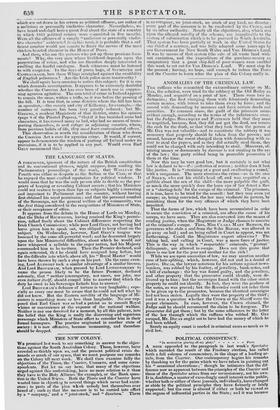ANOMALIES OF THE CRIMINAL LAW.
THE ruffians who committed the extraordinary outrage on MI. GEE, the solicitor, were tried for the robbery at the Old Bailey on Monday, and acquitted on a point of law. There were two in- dictments; the first charging them with .feloniously demanding certain monies, with intent to take them dway by force; and the second with demanding by menaces and force certain deeds and securities. To common sense, the guilt of the prisoners seems evident enough, according to the terms of the indictments even; but the Judges BOSANQUET and PATTESON held that they must be acquitted, because, first, they did not get the deed, nor receive the cash for the draft, so that what they took from the person of Mr. GEE was not valuable—and to constitute the robbery it wa, necessary that property should be taken from the person; and second, because the count charged them with demanding with in- tent to steal the papers, and as they did actually steal them, the, could not be charged with only intending to steal. Moreover, ob- taining money or documents by duresse is not stealing in the eye of the law ; the party robbed being in peaceable possession of them at the time.
Now this may be very good law, but it certainly is not what
law is defined to be—tl.e perfection of reason ; neither does it look like justice. It is "straining at a gnat and swallowing a camel," with a vengeance. The more atrocious the crime—as in thc ease of SHEEN, who cut his child's head off; and was acquitted on a quibble about the sex of the child—the more palpable the guilt, so much the more quickly does the keen eye of law detect a flaw or a "starting-hole" for the escape of the criminal. The prisoners, it is true, have to be tried for the assault : but they may even yet escape; or, being convicted, the law may vindicate its powers, by punishing them for the very offences of which they have been acquitted.
That the forms of law, which have been accumulated in order
to secure the conviction of a criminal, are often the cause of his escape, we have seen. They are also converted into the means of evading justice, when the Magistrate or Judge chooses to connive at the criminal's escape. Thus, Miss CLARA MARY BENSON, the governess who stole a seal from the Soho Bazaar, was allowed to go away on bail ; and on being called in Court to appear, was not forthcoming. Could the Magistrates expect otherwise ? The taking bail, and calling in Court, was a mere farce of justice. This is the way in which " respectable " criminals, "genteel" delinquents, are allowed to escape. Does not this prove that there is one law for the poor and another for the rich ?
While we are upon anomalies of law, we may mention another case of hair-spliting, which, however, did not end in a denial of justice. DICAS, the lawyer notorious for his actions against news-
venders, was robbed by his footboy, of jewellery, bank-notes, and a bill of exchange : the boy was found guilty, and the jewellery, and other property that the prosecutor could identify, were de- livered up to him ; but the sovereigns found with the other stolen property he could not identify. In fact, they were the produce of the notes, as was proved; but the Recorder could not order them to be given up to the prosecutor, because the identical sovereigns had not been stolen. Legally they were the property of the thief ;
and it was a question whether the Crown or the Sheriff were the proper claimants. In case, however, the Crown claimed, the Judge said he should recommend the claim to be foregone. The prosecutor did get them ; but by the same adherence to the letter of the law through which the ruffians who robbed Mr. GEE escaped, Mr. DICAS ought not to have had the money of which he had been robbed.
Surely an equity court is needed in criminal cases as much as in civil law.




















 Previous page
Previous page